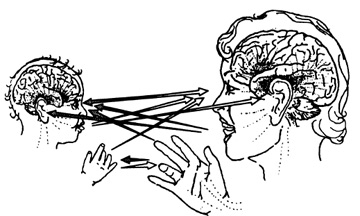| |
|
|
EFFECTS OF A SECURE ATTACHMENT
RELATIONSHIP ON RIGHT BRAIN DEVELOPMENT,
AFFECT REGULATION, AND
INFANT MENTAL HEALTH
ALLAN N. SCHORE
Abstract
Over the last ten years the basic knowledge of brain structure and function has vastly
expanded, and its incorporation into the developmental sciences is now allowing for more
complex and heuristic models of human infancy. In a continuation of this effort, in this
two part work I integrate current interdisciplinary data from attachment studies on
dyadic affective communications, neuroscience on the early developing right brain,
psychophysiology on stress systems, and psychiatry on psychopathogenesis in order to
provide a deeper understanding of the psychoneurobiological mechanisms that underlie
infant mental health.
In this paper I detail the neurobiology of a secure attachment, an exemplar of adaptive
infant mental health, and focus upon the primary caregiveris psychobiological regulation
of the infantis maturing limbic system, the brain areas specialized for adapting to a
rapidly changing environment. The infantis early developing right hemisphere has deep
connections into the limbic and autonomic nervous systems and is dominant for the
human stress response, and in this manner the attachment relationship facilitates the
expansion of the childis coping capacities. This model suggests that adaptive infant
mental health can be fundamentally defined as the earliest expression of flexible
strategies for coping with the novelty and stress that is inherent in human interactions.
This efficient right brain function is a resilience factor for optimal development over the
later stages of the life cycle. |

Department of Psychiatry and Biobehavioral Sciences
University of California at Los Angeles School of Medicine
Article >
back >
|
 |

